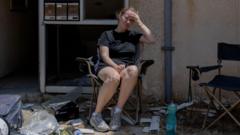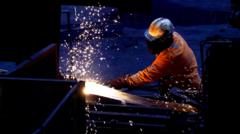Are Israelis Supporting Conflict with Iran After Recent Missile Strike?

Understanding the Current Situation in Bat Yam: A Microcosm of Israel's Ongoing Conflict
In the heart of Israel, the coastal city of Bat Yam has recently found itself at the center of a devastating conflict. Located just south of Tel Aviv, this city has historically been a bastion of support for the right-wing governing coalition in Israel. However, in an instant, the tragic consequences of geopolitical tensions have manifested in a violent missile strike that has shaken the very foundation of this community. This article aims to delve into the implications of the missile attack, the prevailing sentiments of the residents, and the broader context of Israel’s military actions against Iran.
The Missile Strike: A Shocking Reality
In the early hours of Sunday morning, Bat Yam was rocked by an Iranian missile strike that hit a ten-storey residential building, resulting in at least eight fatalities and leaving many trapped under rubble. The sheer power of the ballistic missiles used in this attack underscores the serious escalation of hostilities, especially when compared to the rockets traditionally fired by groups like Hamas and Hezbollah, which Israel's advanced air defense systems frequently intercept.
The Immediate Aftermath
The chaos that ensued was palpable. Local residents reported feeling an overwhelming sense of shock and fear as they witnessed their neighborhood transform into a disaster zone. Veronica Osipchik, a resident living just 200 meters from the strike site, expressed her disbelief at the scale of damage, stating, "It needed to be done… But we didn't expect it to affect us like this." The destruction extended beyond her apartment, with nearly every building in the vicinity suffering similar damages.
Rescue efforts began promptly, with emergency responders working tirelessly to pull those trapped beneath the debris. The harrowing sight of individuals emerging from the ruins, covered in soot and ash, painted a stark image of the human cost of this conflict. As rescue paramedic Ori Lazarovich noted, “I saw fear in their eyes.”
Public Sentiment: Support Amidst Chaos
Despite the devastation, the overwhelming sentiment among the residents is one of support for Israel's military actions against Iran. Many believe that the attack was a necessary step in countering the threat posed by Iran's nuclear ambitions. Avi, a lifelong Bat Yam resident, expressed this sentiment strongly, declaring, "We need to keep hitting [Iran]. Of course we have to keep going. Otherwise, they'll drop an atomic bomb on us." This perspective reflects a broader consensus within segments of the Israeli population who view military action as a justified means of ensuring national security.
The Justification for Military Action
Israel's rationale for its aggressive stance against Iran is rooted in a long-standing fear of a nuclear-armed Iran. Successive Israeli governments have voiced alarm over Iran’s nuclear capabilities, which they argue could pose an existential threat to the nation. Even amidst ongoing challenges in Gaza, political rivals to Prime Minister Netanyahu, such as Benny Gantz and Yair Lapid, have echoed support for military action against Iran, highlighting a unifying sense of urgency in the face of perceived threats.
The Broader Context: A Region in Turmoil
The situation in Bat Yam is not an isolated incident but rather part of a larger geopolitical struggle that has been escalating over recent years. Professor Yossi Mekelberg from Chatham House emphasizes that the current conflict extends beyond Hamas in Gaza or Hezbollah in Lebanon; it represents a more significant, complex confrontation with Iran. "This is evolving into a full-blown war," he warns, suggesting that fatigue may set in among the Israeli populace if casualties continue to mount and the conflict drags on.
Political Ramifications
The political landscape in Israel is also shifting in response to the conflict. Far-right national security minister Itamar Ben Gvir visited Bat Yam to console mourners and reinforce support for military actions. His presence, coupled with Netanyahu's visit — during which he was greeted with chants of “Bibi, King of Israel” — illustrates the intertwining of national security and political identity within Israeli society.
The Human Cost: A Nation Under Siege
The human toll of this conflict is profound. As families mourn their losses, the question remains: how long can the Israeli public sustain support for an ongoing military campaign? The potential for escalating civilian casualties could lead to a shift in public opinion, even among those who currently support the government's actions. The delicate balance between national security and humanitarian concerns is increasingly difficult to maintain.
Challenges Ahead
As the conflict continues and the situation in Bat Yam and beyond evolves, several challenges loom on the horizon:
- Casualty Management: The impact of civilian casualties could sway public opinion against prolonged military engagement.
- Economic Impact: The destruction of infrastructure and the psychological toll of conflict could have long-term ramifications on the local economy.
- International Relations: Israel's actions may provoke international scrutiny and could complicate diplomatic relations with other nations.
Conclusion: A City at a Crossroads
Bat Yam stands as a microcosm of the broader struggles faced by Israel today. The missile strike has highlighted the fragility of life in a region marked by ongoing conflict and uncertainty. As residents navigate the aftermath of this tragedy, their resilience is evident, yet the underlying tensions continue to simmer. While there is currently robust support for military action against Iran, the question remains: how long will this support endure in the face of mounting casualties and prolonged conflict? The coming days and weeks will be critical in shaping the future of Bat Yam and the broader Israeli landscape.
FAQs
What triggered the missile strike on Bat Yam?
The missile strike was part of Israel's military response to perceived threats from Iran, particularly regarding its nuclear program.
How have residents of Bat Yam reacted to the attack?
Many residents express support for Israel's military actions against Iran, viewing them as necessary for national security, despite the tragic loss of life and destruction in their community.
What are the implications of this conflict for Israel's future?
The ongoing conflict may lead to shifts in public opinion, especially if civilian casualties continue to rise. Additionally, the economic and political ramifications could be significant as Israel navigates its security policies.
As Bat Yam grapples with the aftermath of this attack, the larger question remains: how can a nation maintain its resolve in the face of such profound human loss? #BatYam #Israel #ConflictResolution
Published: 2025-06-16 10:59:04 | Category: technology



